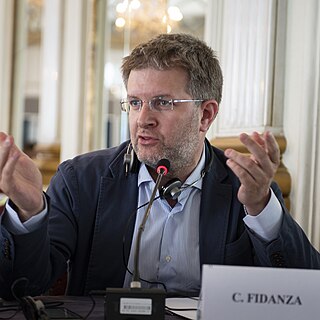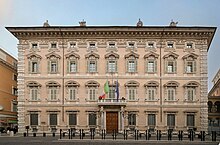
The House of Lords is the upper house of the Parliament of the United Kingdom. Like the lower house, the House of Commons, it meets in the Palace of Westminster in London, England. One of the oldest extant institutions in the world, its origins lie in the early 11th century and the emergence of bicameralism in the 13th century.

An institutional referendum was held by universal suffrage in the Kingdom of Italy on 2 June 1946, a key event of contemporary Italian history. Until 1946, Italy was a kingdom ruled by the House of Savoy, reigning since the unification of Italy in 1861 and previously rulers of the Kingdom of Sardinia. In 1922, the rise of Benito Mussolini and the creation of the Fascist regime in Italy, which eventually resulted in engaging the country in World War II alongside Nazi Germany, considerably weakened the role of the royal house.
Unicameralism is a type of legislature consisting of one house or assembly that legislates and votes as one. Unicameralism has become an increasingly common type of legislature, making up nearly 60% of all national legislatures and an even greater share of subnational legislatures.

The Chamber of Deputies is the lower house of the bicameral Italian Parliament, the upper house being the Senate of the Republic. The two houses together form a perfect bicameral system, meaning they perform identical functions, but do so separately. The Chamber of Deputies has 400 seats, of which 392 are elected from Italian constituencies, and 8 from Italian citizens living abroad. Deputies are styled The Honourable and meet at Palazzo Montecitorio.

The Party of Italian Communists was a communist party in Italy established in October 1998 by splinters from the Communist Refoundation Party (PRC). The split was led by Armando Cossutta, founder and early leader of the PRC, who opposed Fausto Bertinotti's leadership and, especially, his decision to withdraw support from Romano Prodi's first cabinet. In December 2014, the party was transformed into the Communist Party of Italy (PCd'I), which would later evolve into the new version of the Italian Communist Party (PCI).

The emblem of the Italian Republic was formally adopted by the newly formed Italian Republic on 5 May 1948. Although often referred to as a coat of arms, it is an emblem as it was not designed to conform to traditional heraldic rules. The emblem is used extensively by the Italian government.

The Aventine Secession was the withdrawal of the parliament opposition, mainly comprising the Italian Socialist Party, Italian Liberal Party, Italian People's Party and Italian Communist Party, from the Chamber of Deputies in 1924–25, following the murder of the deputy Giacomo Matteotti by fascists on 10 June 1924.

The Gazzetta Ufficiale della Repubblica Italiana is the official journal of record of the Italian government. It is published by the Istituto Poligrafico e Zecca dello Stato in Rome.

The Senate of the Kingdom of Italy was the upper house of the bicameral parliament of the Kingdom of Italy, officially created on 4 March 1848, acting as an evolution of the original Subalpine Senate. It was replaced on 1 January 1948 by the present-day Senate of the Republic. All of its members were appointed by the King.

Chamber of Fasces and Corporations was the lower house of the legislature of the Kingdom of Italy from 23 March 1939 to 5 August 1943, during the height of the regime of Benito Mussolini's National Fascist Party.

The House of Commons of England was the lower house of the Parliament of England from its development in the 14th century to the union of England and Scotland in 1707, when it was replaced by the House of Commons of Great Britain after the 1707 Act of Union was passed in both the English and Scottish parliaments at the time. In 1801, with the union of Great Britain and Ireland, that house was in turn replaced by the House of Commons of the United Kingdom.

The Subalpine Senate was the upper house of the Kingdom of Sardinia and one of the two houses of its bicameral parliament, the other being the Chamber of Deputies. It was set up in 1848 following the fusion of the Savoyard states. It became the Senate of the Kingdom of Italy upon the unification of Italy in 1861. It is the direct ancestor of the present Italian Senate. Its name was a reference to the Napoleonic Subalpine Republic.

Brothers of Italy is a national-conservative and right-wing populist political party in Italy, that is currently the country's ruling party. After becoming the largest party in the 2022 Italian general election, it consolidated as one of the two major political parties in Italy during the 2020s along with the Democratic Party. The party is led by Giorgia Meloni, the incumbent Prime Minister of Italy. Meloni's tenure has been described as the "most right-wing" republican government in Italy since World War II, whilst her time in government is frequently described as a shift towards the far-right in Italian politics.
The Right group, later called Historical Right by historians to distinguish it from the right-wing groups of the 20th century, was an Italian conservative parliamentary group during the second half of the 19th century. After 1876, the Historical Right constituted the Constitutional opposition toward the left governments. It originated in the convergence of the most liberal faction of the moderate right and the moderate wing of the democratic left. The party included men from heterogeneous cultural, class, and ideological backgrounds, ranging from British-American individualist liberalism to Neo-Hegelian liberalism as well as liberal-conservatives, from strict secularists to more religiously-oriented reformists. Few prime ministers after 1852 were party men; instead they accepted support where they could find it, and even the governments of the Historical Right during the 1860s included leftists in some capacity.

The Chamber of Deputies of the Kingdom of Italy was the main legislative body of the Kingdom of Italy descended from the lower house of the Kingdom of Sardinia, but supplemented with deputies from territories captured during the Second Italian War of Independence and the Expedition of the Thousand. Along with the Senate of the Kingdom of Italy, it formed the Parliament of the Kingdom of Italy from 1861 until 1939.

The Chamber of Deputies was the lower house of the Kingdom of Sardinia and one of the two houses of its bicameral parliament, the other being the Subalpine Senate. It became the Chamber of Deputies of the Kingdom of Italy upon the unification of Italy in 1861.

The Parliament of the Kingdom of Sardinia, also called Subalpine Parliament, was the bicameral parliament of the Kingdom of Sardinia.

Carlo Fidanza is an Italian politician who has served as a Member of the European Parliament (MEP) since 2019, previously holding a seat from 2009 to 2014. He is a member of Brothers of Italy (FdI).

The proclamation of the Kingdom of Italy happened with a normative act of the Savoyard Kingdom of Sardinia — the law 17 March 1861, n. 4761 — with which Victor Emmanuel II assumed for himself and for his successors the title of King of Italy. 17 March is commemorated annually by the anniversary of the unification of Italy, a national holiday established in 1911 on the occasion of the 50th anniversary, and also celebrated, in the Republican era, in 1961 and 2011.

The Anniversary of the Unification of Italy is a national day that falls annually on 17 March and celebrates the birth of Italy as a modern nation state, which took place following the proclamation of the Kingdom of Italy on 17 March 1861.


















